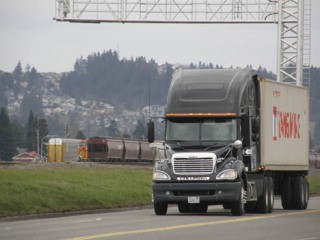Members of the city’s Public Works Committee on Monday decided to shelve indefinitely a proposal to impose a license excise on businesses that operate loading dock doors.
But the problem that led city officials to consider the idea remains: Where to find the big bucks to repair the city’s freight corridors, wearing away under the constant coming and going of large freight trucks?
Councilman Rich Wagner, chair of the city’s Public Works Committee, said the economy weighed heavily on the decision.
“We decided that there were several effects of today’s economic situation,” Wagner said. “One, we wouldn’t get much money from the excise because people would just close a lot of their doors and make do with fewer doors. It was also a tough extra expense at this time. And it wouldn’t have generated near as much revenue as we would need to solve the problem. So we decided to table it until we could find a more comprehensive revenue source.”
Nancy Wyatt, director of the Auburn Area Chamber of Commerce, said the organization favors a more public process to acquire the money needed to deal with the problem. She said it is wrong to expect any one sector of motorists to bear the brunt of solving the problem.
And it is a big problem.
So much rides upon Auburn’s freight corridors – the economy, the movement of goods to markets, the ordinary driver’s ability to get around the city. But freight corridors like C Street Southeast are breaking down under the constant traffic. City officials say the big freight trucks have much do with all that wear and tear.
Depending on the size of the truck and the street, they cite studies showing that freight trucks can cause up to 60 percent more damage than a passenger vehicle.
Fixes are imperative, and pricey, and current taxing methods cannot meet the need.
Members of the Auburn Citizen’s Arterial Task Force first recommended imposing a license excise upon businesses that operate loading dock doors. There are an estimated 4,400 such loading dock doors within city limits.
Members of the City’s Public Works and Finance committees then studied a draft ordinance detailing the excise.
First proposed for imposition in June 2009, the excise was to have been a part of the business licensing procedure, based upon the number of doors each business has. Those with two doors or fewer would have been exempt. Upon payment of the appropriate excise amount, the applicant would be issued a loading dock door license to be posted outside each loading door it operates in the city. Each license would be renewed annually at the time of the renewal date of the business’s annual city business license.
All proceeds were to have been deposited into the Freight Mobility Fund, which is created within the office of the city’s finance director.
City officials first estimated an excise of $284 per door to meet the need. But at a City Council financial retreat last week, Councilwoman Sue Singer suggested easing into things by imposing $125 in the first year, $250 the second year and up to $375 in the third year.
Auburn Mayor Pete Lewis said the revenue raised would not have been enough by itself, but with other grant funds added in would have met the need.
Wagner said the city received mixed comments.
“Some as you might expect were absolutely against another tax. Others were more sensible and said, ‘Come back and see us in a year or two.’ “
Wagner said the city will settle for patching streets this summer.
“The roads will look funny, but they’ll drive a lot better,” Wagner said. “Patching is where they dig out the pavement and put an improved base in and put a thicker piece of pavement in there. It’s not like a pothole patch, it can be 20- to 50-feet-long and 3-to-5-feet wide.”


